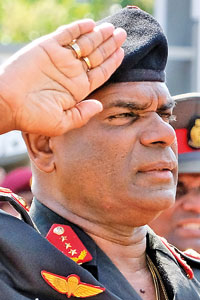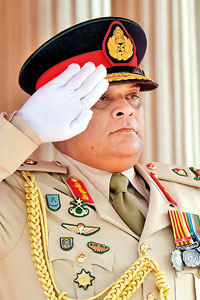News
Waiting for Sirisena: Sri Lanka was without an Army Commander for almost a day
In an island nation where every politician is waxing eloquent about protecting national security, Sri Lanka was without a Commander of the Army for almost a day.

Gen. Mahesh Senanayake
Lt Gen. Mahesh Senanayake, now promoted General, ended his term as Army Commander last Sunday. Hours went by on Monday as Defence Secretary General Shantha Kottegoda waited for President Sirisena’s return from Polonnaruwa to take a decision. It did not happen till late Monday afternoon.
That wait for Gen Kottegoda was akin to what his predecessor Hemasiri Fernando complained after the April 21 Easter Sunday attacks. He had to wait with a collection of files in hand, sometimes for hours, to obtain an appointment to see his Minister of Defence — President Sirisena. By a strange quirk of fate, it turned out to be Gen. Kottegoda’s unfortunate turn.
Before last Sunday, Gen. Kottegoda, a source said, had made several attempts to reach President Sirisena on the telephone to decide on the top appointment. However, the President was busy with a string of engagements in the Polonnaruwa District. So, the Defence Secretary had to await his return.
Gen. Senanayake, meanwhile, pondered how he could get to office on Monday since his extended one-year-term had ended the previous day, Sunday. So, he chose to stay put at the General’s House. His number two, then Chief of Staff Major General Shavendra de Silva, visited President Sirisena’s Mahagamsekera Mawatha residence in Colombo to ascertain whether there was any news for him.
He was asked to return later that day in a move that indicated that no decision had yet been made. It was only thereafter that President Sirisena gave his attention to this key appointment.

Lt. Gen. Shavendra de Silva
Late Monday afternoon he decided that Maj. Gen. Shavendra de Silva should be the 23rd Commander of the Sri Lanka Army. This was after promoting him to the rank of a General. He told an aide that he had already given two extensions to then Lt. Gen. Senanayake. The official announcement came thereafter.
The move was not fair by both the new General and the former Commander promoted to the same rank. One could not plan his departure ceremonies and make farewell calls on different units. The other was unable to plan his takeover. In the military such traditions are time honoured and carried out to precision.
The Western diplomatic community in Colombo reacted strongly by accusing Gen. Silva of violating human rights. Through diplomatic channels, the US had earlier warned the government that his appointment could meet with displeasure by the US. It issued a statement. The European Union followed suit together with the UN Human Rights Council.
The US position is based on what is called the Leahy Laws that prohibit the Department of State and the Department of Defence from providing military assistance to foreign security force units that violate human rights. It is named after the Democratic Senator for Vermont, Senator Patrick Leahy.
Under this law, the US Embassy is among those tasked to vet potential recipients of security assistance to units alleged to have been “credibly implicated” in a serious abuse of human rights. The Leahy law has led to military assistance being denied to Bangladesh, Bolivia, Columbia, Guatemala, Mexico, Nigeria, Turkey, Indonesia, Lebanon and St Lucia. Joining in yesterday was the London based Global Tamil Forum which called the appointment “deeply troubling.”
However, in Colombo, different groups were livid by those expression of disapproval and insisted that no one had the right to intervene in Sri Lanka’s sovereignty. Even the UNF government which was cause for the formulation of reports against General Silva by co-sponsoring a resolution at the Human Rights Council backed President Sirisena’s decision. That was a clear snub for then Foreign Minister Mangala Samaraweera who not only co-sponsored the Geneva resolution but also spoke strongly in favour.
In a statement on Thursday, Gen. Silva defended himself. Excerpts from a two-page statement he issued state: “Any army anywhere in the world is bound to safeguard the rights of the citizens and also create an environment that enables them to live freely and democratically. An army is also bound to act swiftly with determination against local and foreign threats. I must remind that the army is bound to protect international humanitarian rights while safeguarding and maintaining proper standards.
“During the last humanitarian operation, we showed this to the world through our actions while the barbaric terrorists were holding innocent civilians as human shields. Our war heroes’ made immense sacrifices to save those civilians. This is no secret to all communities. It is our responsibility to continue to work towards ensuring and creating a climate that lives of all communities are safe and they are able to live peacefully in harmony.
“It’s our responsibility to ensure that the reputation of the Sri Lankan army is continued to be maintained in a manner that it is not second to any other army in the world.”

